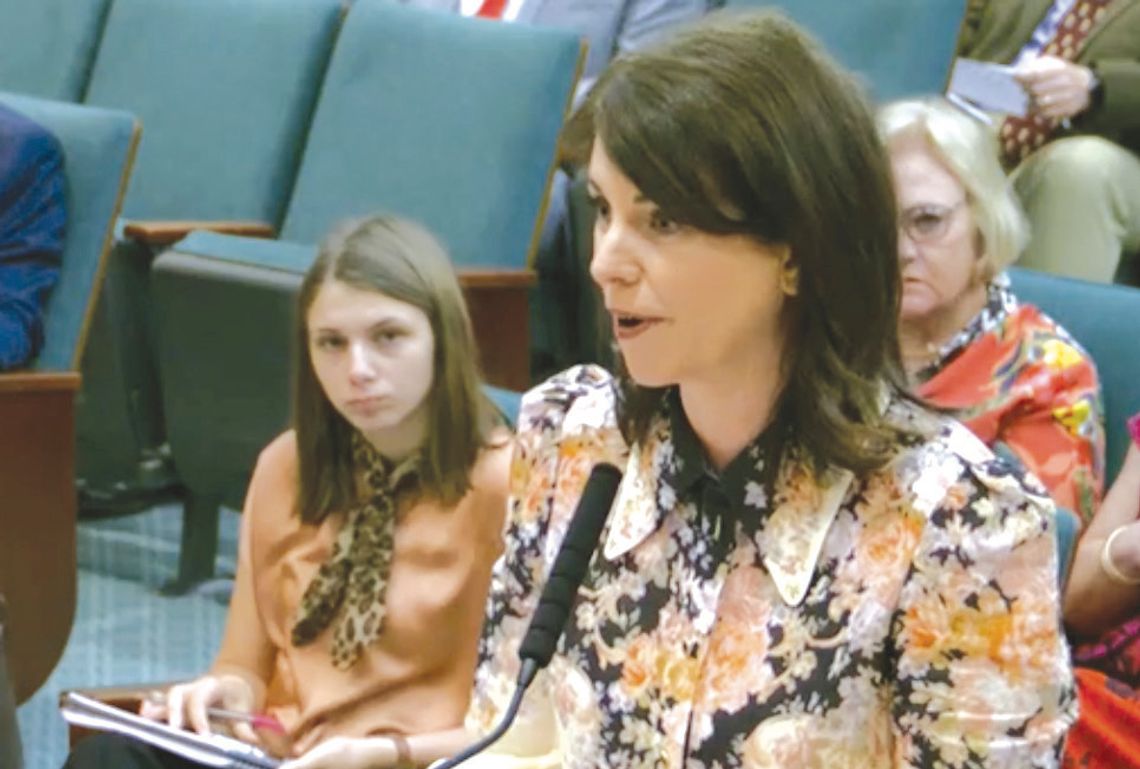Lawmakers and citizens raised questions about air and water quality, air monitoring and blasting at a state hearing which introduced a proposed bill to further regulate aggregate mining.
House Bill 3482, sponsored by State Rep. Ellen Troxclair (HD-19) was detailed April 9 at the hearing conducted by the House Committee on Natural Resources in Austin. Troxclair’s district includes Burnet, Blanco, Gillespie and part of western Travis County.
Troxclair provided details about her bill and its intent to committee members.
“These are not only es- sential to our environment but serve as vital centers for recreation, education and community,” Troxclair said. “However, the growing presence of quarry and mining operations near these sensitive areas poses a significant risk to our water quality, wildlife and public health.
“HB3482 responds to these concerns by ensuring that LCRA can confirm that any quarries or mines, located within a reasonable distance of a lake owned or operated by LCRA or the entrance of two or more state parks or caverns managed by Texas Parks and Wildlife or two miles of a youth camp licensed by the state department of health services would not harm existing sensitive environments.”
Addressing committee members, Troxclair continued: “Burnet County, House District 19, honestly the entire thing, does more than its fair share to provide the needed asphalt and industry for our state.”
An amendment to HB3482 reads: “The authority may not issue a permit for a quarry or mine at a site to which this section applies unless the authority or the commission has performed a study and confirmed that the proposed quarry or mining operation will not harm any lake or state park.”
She stated her bill would provide a “reasonable and common sense balance” to aggregate mining regulation.
“I fully understand and support the need for those important resources,” Troxclair told committee members.
“This is in no way an outright ban on quarries or mining operations. Instead, it simply allows the LCRA or the TCEQ to conduct a study confirming that a proposed site near these sensitive areas would not harm the lakes or the state parks,” she added.
The state representative emphasized concerns about a recently-permitted operation proposed on two hundred acres off Burnet County Road 3509.
Located in Hoover’s Valley, the Asphalt Inc. planned rock crushing and quarry operation would open within a few miles of Inks Lake, Inks Lake State Park, Longhorn Caverns and Camp Longhorn in Burnet County. TCEQ approved an air permit in February. A decision on an LCRA water quality permit is pending.
Troxclair told committee members that Camp Longhorn, founded by Tex and Pat Robertson in 1939, is located along the shoreline of Inks Lake.
“At some point when we have mining and blasting going on right next to things like caverns or right next to things like Camp Longhorn with open air tents that have been around for a century, those things matter too,” Troxclair said. “You can’t send your kids to a summer camp in Texas in the heat without clean water for them to swim in.
“The potential runoff for quarries and contaminations threatens not only the camp but the broader watershed that sustains the lake and the surrounding ecosystem.”
Other presenters at the hearing included Dennis W. Donley Jr., Grace Fowler, Nan Robertson Manning of Camp Longhorn, Fermin Ortiz of Texans for Responsible Aggregate Mining (TRAM) and Todd Sifleet.
Committee members engaged with representatives from Texas Commission on Environmental Quality (TCEQ), who answered questions about their air quality monitoring process.
Committee member Rep. Brad Buckley (HD54) asked how TCEQ conducts monitoring.
TCEQ representative Sam Short told committee members: “What we’re looking at, air quality- wise, is inhalable particulate matter … of 10 microns or 2.5 microns or less.
“Basically, it would fit on the head of a pencil,” Short added. “The stuff you see in the air that you can actually see is not the stuff we’re concerned with.
“Certain activities put smaller particulate into the air. As that particulate falls out out, we look at those smaller particulates falling out at the fence line.”
Short further explained their focus.
“The larger stuff that you see, that can be caught in the wind. That can be carried, and that can be considered a nuisance in which our local office will come out and we have requirements in the permit to provide ways to prevent nuisance dust from leaving the site such as watering,” he said. “The stuff that you can see, our bodies have ways to prevent it from getting into our longs like nose hairs.
“The stuff you can’t see that we model against and make determinations of what those emissions would look like and how they fall out.”
Committee member Rep. Roman Romero (HD-90) expressed the aversion of the aggregate industry by citizens.
“In a lot of areas where there’s quarries, there’s not just one. There’s many,” Romero said. “I can see where people can get frustrated because they’re like, ‘Hey, we’ve already got enough.’ ‘When is enough enough?’” At one point Romero asked if TCEQ has found “evidence” of air quality issues in Burnet County.
Short responded, “We don’t have any evidence that there is an issue with air quality from the existing quarries.”
Other highlights include Short being unsure of the number of rock crushing operations in Burnet County.
Public information collected by the advocacy group saveburnet.com unveiled 58 facilities in the county: 168 rock and concrete crushers, 17 aggregate production operations, 10 bulk mineral handling, seven asphalt plants and six concrete batch plants.
Rep. Erin Zwiener (HD-45) pressed Short on whether TCEQ placed air quality monitors in Burnet County.
When asked about monitoring, Short said: “I don’t believe there is a specific monitor in Burnet County, so usually in those instances we would use a worst case representative monitor, and we do have monitors in other parts of the state that are near aggregate production operations of various sizes that could be utilized to represent what the emissions would look like from something like this.”
Representative for TCEQ included Joel Anderson and Robert Sadlier as well as Short.
Another bill that may advance is TX House Bill 5151, sponsored by State Rep. Terry Wilson (HD20), a district adjacent to Troxclair’s district.
Wilson, whose district is adjacent to Troxclair’s district, filed the bill March 14. His bill offers a direct prohibition approach not tied to the permitting process.
The bill states that:“[C] rushing facilities are prohibited at any site that is located within: (1) four miles of a lake owned or operated by a Texas river authority, with a national fish hatchery; (2) four miles of the entrance of a state park operated by the Texas Parks and Wildlife Department with a cavern dedicated as a National Natural Landmark dedicated in 1971; and (3) two miles of a youth camp founded in 1975 and licensed by the Texas Department of State Health Services.
(b) Subsection (a) does not apply to a site that was legally operating as a mine, quarry, or rock crushing facility on or before January 1, 2025.
This bill was referred April 7 to the House Environmental Regulation Committee.
In the meantime, Troxclair’s bill remains under consideration for possible advancement by the House Committee on Natural Resources awaiting an advancement vote.
“It is critical not just to my district but for the protection of the environment and the historic institutions across our state,” Troxclair told committee members.













